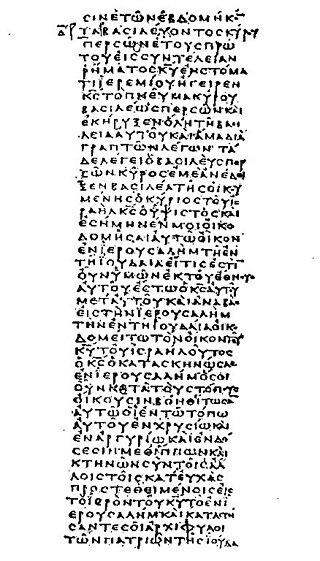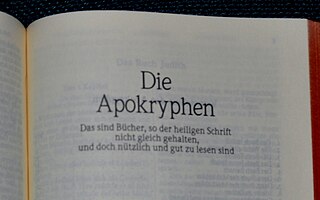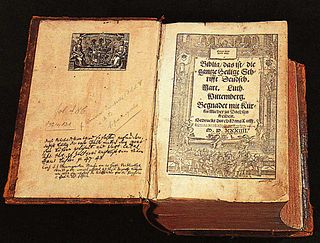The deuterocanonical books are books and passages considered by the ethiopian jews, the Catholic Church, the Eastern Orthodox Church, the Oriental Orthodox Churches, and/or the Assyrian Church of the East to be canonical books of the Old Testament, but which most Jews nowadays and Protestants regard as apocrypha. They date from 300 BC to 100 AD, before the separation of the Christian church from Judaism. While the New Testament never directly quotes from or names these books, the apostles quoted the Septuagint, which includes them. Some say there is a correspondence of thought, and others see texts from these books being paraphrased, referred, or alluded to many times in the New Testament, depending in large measure on what is counted as a reference.

The King James Version (KJV), also the King James Version Bible (KJVB) and the Authorized Version (AV) is an Early Modern English translation of the Christian Bible for the Church of England, which was commissioned in 1604 and published in 1611, by sponsorship of King James VI and I. The 80 books of the King James Version include 39 books of the Old Testament, 14 books of Apocrypha, and the 27 books of the New Testament.

The Septuagint, sometimes referred to as the Greek Old Testament or The Translation of the Seventy, and often abbreviated as LXX, is the earliest extant Greek translation of the Hebrew Bible from the original Hebrew. The full Greek title derives from the story recorded in the Letter of Aristeas to Philocrates that "the laws of the Jews" were translated into the Greek language at the request of Ptolemy II Philadelphus by seventy-two Hebrew translators—six from each of the Twelve Tribes of Israel.

The Vulgate, sometimes referred to as the Latin Vulgate, is a late-4th-century Latin translation of the Bible.

The Matthew Bible, also known as Matthew's Version, was first published in 1537 by John Rogers, under the pseudonym "Thomas Matthew". It combined the New Testament of William Tyndale, and as much of the Old Testament as he had been able to translate before being captured and put to death. Myles Coverdale translated chiefly from German and Latin sources and completed the Old Testament and Biblical apocrypha, except for the Prayer of Manasseh, which was Rogers', into the Coverdale Bible. It is thus a vital link in the main sequence of English Bible translations.

The Bishops' Bible is an English edition of the Bible which was produced under the authority of the established Church of England in 1568. It was substantially revised in 1572, and the 1602 edition was prescribed as the base text for the King James Version that was completed in 1611.
Partial Bible translations into languages of the English people can be traced back to the late 7th century, including translations into Old and Middle English. More than 100 complete translations into English have been produced. A number of translations have been prepared of parts of the Bible, some deliberately limited to certain books and some projects that have been abandoned before the planned completion.

The Douay–Rheims Bible, also known as the Douay–Rheims Version, Rheims–Douai Bible or Douai Bible, and abbreviated as D–R, DRB, and DRV, is a translation of the Bible from the Latin Vulgate into English made by members of the English College, Douai, in the service of the Catholic Church. The New Testament portion was published in Reims, France, in 1582, in one volume with extensive commentary and notes. The Old Testament portion was published in two volumes twenty-seven years later in 1609 and 1610 by the University of Douai. The first volume, covering Genesis to Job, was published in 1609; the second, covering the Book of Psalms to 2 Maccabees plus the three apocryphal books of the Vulgate appendix following the Old Testament, was published in 1610. Marginal notes took up the bulk of the volumes and offered insights on issues of translation, and on the Hebrew and Greek source texts of the Vulgate.
Early Modern English Bible translations are those translations of the Bible which were made between about 1500 and 1800, the period of Early Modern English. This was the first major period of Bible translation into the English language including the King James Version and Douai Bibles. The Reformation and Counter-Reformation led to the need for Bibles in the vernacular with competing groups each producing their own versions.

Chapter and verse divisions did not appear in the original texts of Jewish or Christian bibles; such divisions form part of the paratext of the Bible. Since the early 13th century, most copies and editions of the Bible have presented all but the shortest of the scriptural books with divisions into chapters, generally a page or so in length. Since the mid-16th century, editors have further subdivided each chapter into verses – each consisting of a few short lines or of one or more sentences. In the King James Version (KJV) Esther 8:9 is the longest verse and John 11:35 is the shortest. Sometimes a sentence spans more than one verse, as in the case of Ephesians 2:8–9, and sometimes there is more than one sentence in a single verse, as in the case of Genesis 1:2.

2 Esdras is an apocalyptic book in some English versions of the Bible. Tradition ascribes it to Ezra, a scribe and priest of the fifth century BC, whom the book identifies with the sixth-century figure Shealtiel.

Parts of the Bible have been translated into Welsh since at least the 15th century, but the most widely used translation of the Bible into Welsh for several centuries was the 1588 translation by William Morgan, Y Beibl cyssegr-lan sef Yr Hen Destament, a'r Newydd as revised in 1620. The Beibl Cymraeg Newydd was published in 1988 and revised in 2004. Beibl.net is a translation in colloquial Welsh which was completed in 2013.
These are the books of the Vulgate along with the names and numbers given them in the Douay–Rheims and King James versions of the Bible. They are all translations, and the Vulgate exists in many forms. There are 76 books in the Clementine edition of the Latin Vulgate, 46 in the Old Testament, 27 in the New Testament, and 3 in the Apocrypha.

The biblical apocrypha denotes the collection of apocryphal ancient books thought to have been written some time between 200 BC and AD 100. The Catholic, Eastern Orthodox and Oriental Orthodox churches include some or all of the same texts within the body of their version of the Old Testament, with Catholics terming them deuterocanonical books. Traditional 80-book Protestant Bibles include fourteen books in an intertestamental section between the Old Testament and New Testament called the Apocrypha, deeming these useful for instruction, but non-canonical. To this date, the Apocrypha are "included in the lectionaries of Anglican and Lutheran Churches". Anabaptists use the Luther Bible, which contains the Apocrypha as intertestamental books; Amish wedding ceremonies include "the retelling of the marriage of Tobias and Sarah in the Apocrypha". Moreover, the Revised Common Lectionary, in use by most mainline Protestants including Methodists and Moravians, lists readings from the Apocrypha in the liturgical calendar, although alternate Old Testament scripture lessons are provided.
The Old Testament is the first section of the two-part Christian biblical canon; the second section is the New Testament. The Old Testament includes the books of the Hebrew Bible (Tanakh) or protocanon, and in various Christian denominations also includes deuterocanonical books. Orthodox Christians, Catholics and Protestants use different canons, which differ with respect to the texts that are included in the Old Testament.

The term Catholic Bible can be understood in two ways. More generally, it can refer to a Christian Bible that includes the whole 73-book canon recognized by the Catholic Church, including some of the deuterocanonical books of the Old Testament which are in the Greek Septuagint collection, but which are not present in the Hebrew Masoretic Text collection. More specifically, the term can refer to a version or translation of the Bible which is published with the Catholic Church's approval, in accordance with Catholic canon law.
The Codex Sangermanensis I, designated by g1 or 7, is a Latin manuscript, dated AD 822 of portions of the Old Testament and the New Testament. The text, written on vellum, is a version of the Latin. The manuscript contains the Vulgate Bible, on 191 leaves of which, in the New Testament, the Gospel of Matthew contain Old Latin readings. It contains Shepherd of Hermas.
A biblical canon is a set of texts which a particular Jewish or Christian religious community regards as part of the Bible.

A Protestant Bible is a Christian Bible whose translation or revision was produced by Protestant Christians. Typically translated into a vernacular language, such Bibles comprise 39 books of the Old Testament and 27 books of the New Testament, for a total of 66 books. Some Protestants use Bibles which also include 14 additional books in a section known as the Apocrypha bringing the total to 80 books. This is in contrast with the 73 books of the Catholic Bible, which includes seven deuterocanonical books as a part of the Old Testament. The division between protocanonical and deuterocanonical books is not accepted by all Protestants who simply view books as being canonical or not and therefore classify books found in the Deuterocanon, along with other books, as part of the Apocrypha. Sometimes the term "Protestant Bible" is simply used as a shorthand for a bible which contains only the 66 books of the Old and New Testaments.

The Bible translations into Latin date back to classical antiquity.